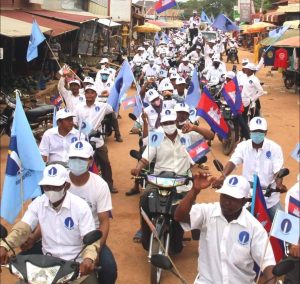Cambodia’s National Election Committee (NEC) has rejected the application of the country’s main opposition party to take part in this year’s national election, all but ensuring another clean sweep for Prime Minister Hun Sen’s ruling party.
In a statement yesterday, the NEC said that it would not register the Candlelight Party (CLP) for the July 23 election, for failing to attach a notarized copy of the party’s registration document with its application.
As a result, the July election looms as a repeat of the last election in 2018, when Hun Sen’s Cambodian People’s Party (CPP) won all 125 seats in the National Assembly. This followed the court-ordered dissolution in late 2017 of the popular Cambodia National Rescue Party (CNRP), which came close to toppling the CPP during a euphoric election campaign in 2013.
Ahead of the May 8 registration deadline, the NEC informed the CLP that it required a notarized copy of the letter from the Interior Ministry confirming the party’s registration in 1998, when it was known as the Sam Rainsy Party. CLP officials say that they cannot provide the document, which was lost when the CNRP offices were raided by government agents in 2017, but insist that this was not a requirement for last year’s commune elections. The CLP announced yesterday that it will appeal to the Constitutional Council, expressing optimism that the body will overturn the decision.
Lapsing into dormancy after the CNRP was established from a merger of the Sam Rainsy Party and Kem Sokha’s Human Rights Party in 2012, the CLP re-emerged in late 2021. It went on to perform well at commune elections last year, winning 22 percent of the vote. Since then, it has largely filled the vacuum left by the CNRP and threatened to rally the simmering discontent with the corruption, predation, and inequality of the CPP’s rule. This has all but ensured that it has faced near-constant intimidation and pressure, including politically motivated lawsuits and violent attacks on opposition activists and supporters.
The barring of the CLP from July’s poll will do nothing to improve Cambodia’s relations with Western governments. In a statement following yesterday’s announcement from the NEC, the European Union said that it “strongly object[ed]” to the decision, describing it as “another worrying sign of shrinking space for political parties to compete in the upcoming general election.”
The NEC’s decision speaks to the intense paranoia of Cambodia’s ruling elite in general and Hun Sen in particular, which appears to be particularly intense given the looming handover of power from the Cambodian leader to his son and anointed successor, Hun Manet. Even though the CLP stood little chance of unseating the CPP, and even though its participation (however constrained) would have helped moderate Cambodia’s poor image in the West, the CPP clearly decided that allowing it to participate was not worth the chance.
In an interview with the U.S.-funded broadcaster Radio Free Asia (RFA), Sam Rainsy, who currently lives in exile in France, pointed out that the 45-year-old Hun Manet is standing for a parliamentary seat in the capital Phnom Penh, which has historically voted heavily for opposition parties. As a result, Hun Sen may have wanted to save him from the ignominy of a strong CLP showing there.
Given the potential for intra-party tensions to emerge during the upcoming transition, Hun Sen, now 70 years of age, clearly views the next few years as highly sensitive and crucial for the enshrining of his legacy. If the price is a further deterioration in Cambodia’s international image, this would appear to be a price that the Cambodian PM is willing to pay, especially given the support that he now enjoys from China.
The problem, of course, is that this move will do little to address the public discontent with CPP rule, rooted in the country’s extractive political economy. Indeed, it is likely to intensify it. However, distracted by its internal affairs, Hun Sen is aiming less at a definitive resolution of Cambodia’s social and economic contradictions than an ad hoc solution to short-term political challenges. What comes next is a problem for tomorrow.
































